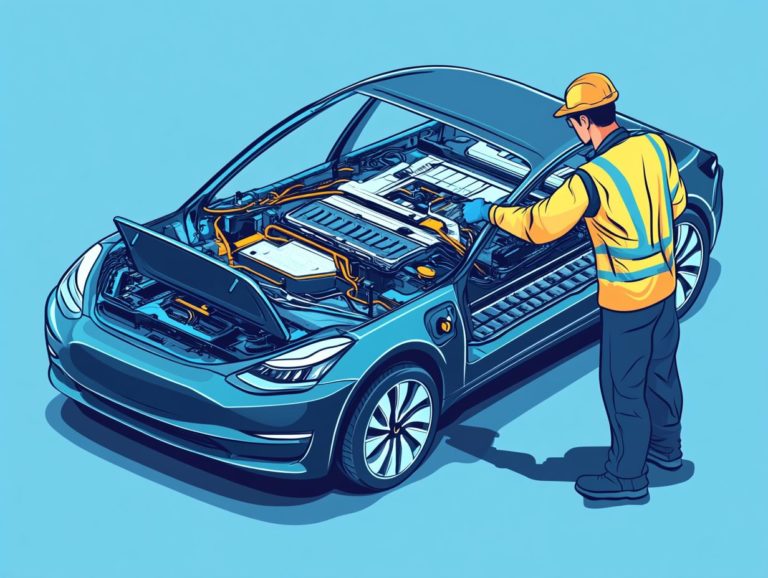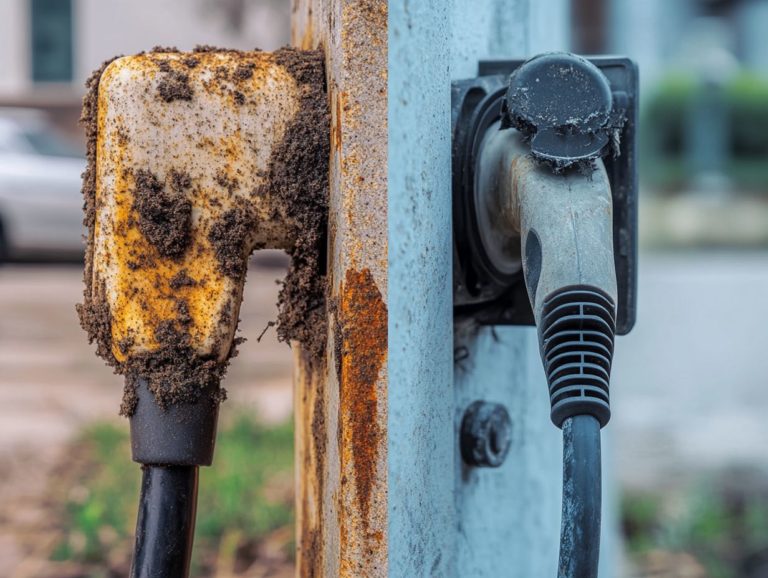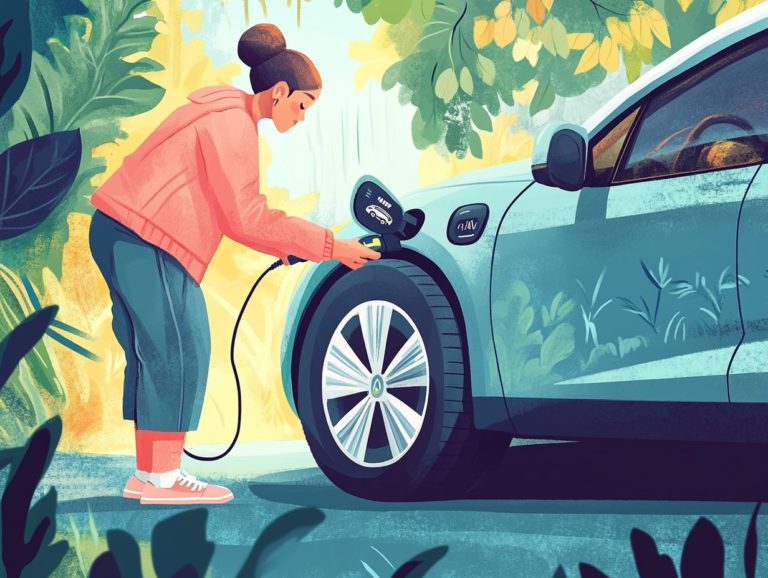what to do if your ev won’t start
Experiencing difficulties when starting your electric vehicle (EV) can be incredibly frustrating, particularly when it’s your go-to for daily commutes.
Gaining insight into the common culprits, such as a dead battery or a malfunctioning charging system, is crucial for effective troubleshooting. This article will walk you through the essential steps to pinpoint the problem, from checking your battery to inspecting electrical components. The article also offers emergency solutions and preventive measures to keep you confidently on the road.
Contents
- Key Takeaways:
- Common Causes of EV Not Starting
- Troubleshooting Steps
- Emergency Solutions
- Preventive Measures
- Regular Maintenance and Inspections
- Proper Charging Habits
- Watch This!
- Frequently Asked Questions
- What should I do if my EV won’t start?
- What could be causing my EV to not start?
- What if my EV’s battery is fully charged but it still won’t start?
- My EV is making strange noises and won’t start. What should I do?
- Can I jump start my EV like a traditional car?
- What if none of these steps work and my EV still won’t start?
Key Takeaways:
Check the battery and charging system, as they are the most common causes of an EV not starting: a dead battery or malfunctioning charging system.
Inspect electrical components for any issues before attempting to start the EV: faulty wiring or loose connections.
If the EV won’t start, try jumpstarting or calling for assistance: emergency solutions when troubleshooting steps don’t work.
Common Causes of EV Not Starting
When your electric car refuses to start, it s more than just a minor inconvenience it can be downright exasperating, especially if your vehicle is relatively new or has a pristine mechanical record.
Grasping the common reasons behind an EV’s refusal to come to life is essential for accurately diagnosing the issue. With various components at play, consider every angle.
You might find yourself overlooking elements like software updates, the intricacies of the electrical system, or even the state of the battery terminals all of which can significantly affect your vehicle’s operational efficiency.
Dead Battery
A dead battery is one of the top reasons your EV won t start. Don t wait until you re stranded; know the signs and act quickly!
It’s essential for you, as an EV owner, to recognize the signs of a dead battery. Look out for indicators such as dim dashboard lights, sluggish electrical responses, or even a complete lack of activity when you attempt to start the vehicle.
To check the small battery, you can use a multimeter to confirm it’s delivering the necessary voltage. Typically, anything below 12.4 volts indicates that charging is in order.
For the main battery, employing a diagnostic tool can offer valuable insights into its overall health.
Engaging in regular maintenance and adopting proper charging habits are crucial to extending battery life and preventing unexpected failures. Simple practices, like avoiding battery depletion below certain levels and scheduling routine checks, can make a remarkable difference.
Malfunctioning Charging System
A malfunctioning charging system is a headache you don t want! Stay ahead of potential problems and keep your EV running smoothly!
This issue can arise from various components within the system, including the charging station, the system that controls battery charging, or even the connectors. Each of these parts plays a vital role in delivering the correct amount of power to your electric vehicle.
Problems like overheating, frayed cables, or outdated software can disrupt this essential process, causing delays and inconvenience for you as a driver.
To maintain optimal charging habits and steer clear of these predicaments, it’s crucial to consult an EV-qualified garage for regular checks and repairs. Their expertise will help you catch minor issues before they escalate into costly repairs, ensuring that your vehicle remains reliable and efficient on the road.
Electrical Issues
Electrical issues can create a significant hurdle when it comes to starting your electric vehicle. These challenges may present themselves in various ways, such as software glitches, corrosion at battery terminals, or even a finicky key fob.
These intricate systems depend on a web of interconnected electrical components, including wiring harnesses, fuses, and relays, each playing an essential role in maintaining proper functionality.
When you neglect to implement software updates regularly, you risk encountering unexpected bugs that could prevent your vehicle from recognizing critical components. Over time, corrosion can accumulate at key junctions, disrupting the electrical flow necessary for a successful startup.
By grasping these factors, you can take proactive steps to tackle potential issues and uphold the overall integrity of your vehicle’s electrical system.
Keep your EV in top shape schedule your maintenance today!
Troubleshooting Steps
When you encounter an electric vehicle that refuses to start, it s crucial to follow effective troubleshooting steps. This helps identify and address the underlying issue, whether it s a dead battery, a malfunctioning charging system, or complex electrical problems that may require a qualified EV technician.
Check Battery and Charging System
Start by checking the battery and charging system. These parts are crucial for your EV.
Ensure you have the right tools, like a multimeter a tool that measures electrical voltage. Begin with the high-voltage battery and look for any error codes that might indicate an internal issue.
Next, check the 12-volt battery; a voltage reading below 12.4 volts could suggest that it s struggling to hold a charge.
After assessing the batteries, inspect the charging system, including connectors and wiring, for any signs of corrosion or loose connections. A thorough inspection often reveals issues that might prevent your vehicle from starting smoothly.
Inspect Electrical Components
Inspect electrical components closely. Look at battery terminals for corrosion and ensure software updates are current.
Examine wiring harnesses, relays, and fuses, as these elements are vital for your vehicle s overall functionality. Corrosion can occur not only at the battery terminals but also on connectors, hindering electricity flow and causing starting issues.
Staying current with software updates is important. These updates often contain critical bug fixes and enhancements that improve vehicle performance. Regular inspections and updates can significantly reduce unexpected issues, giving you peace of mind as a vehicle owner.
Emergency Solutions
In emergencies when your electric vehicle won t start, having a well-prepared set of solutions can be invaluable. Whether it s knowing how to jump-start your EV or calling for assistance from a qualified mechanic, understanding these options enables you to regain access to your vehicle swiftly and efficiently.
Jumpstarting the EV
Jump-starting an electric vehicle is not common but can be necessary. Always follow the manufacturer s guidelines if you need to jump-start your EV.
Unlike gasoline vehicles, electric cars rely on advanced battery technology and complex electronic systems. A careful approach is essential, as wiring and components can vary significantly between different EV models.
If you find yourself with a drained battery, ensure you adhere to the specific guidelines laid out by the manufacturer. If issues persist after attempting a jump start, seek the expertise of an EV-qualified technician. They can accurately diagnose and resolve any underlying problems while ensuring your vehicle’s safety.
Calling for Assistance
If troubleshooting fails to start your electric vehicle, don t worry! Help is just a call away. Reaching out to an EV-qualified mechanic is usually your best option. They will thoroughly examine all electrical systems and charging mechanisms.
These professionals come equipped with specialized tools and training, allowing them to diagnose complex issues that standard troubleshooting might miss. When they arrive, expect a comprehensive check of battery health, charging ports, and wiring to spot any faults or irregularities.
Their expertise in electric vehicle technology enables them to identify underlying problems keeping your vehicle from starting. They will tackle immediate concerns and offer valuable insights on preventive measures and necessary repairs, helping to keep your vehicle running smoothly.
Preventive Measures
Regular maintenance is key. By taking care of your battery and charging habits, you boost your EV’s reliability. Implementing preventive measures is crucial to sidestep the frustration of a car that won’t start.
Regular Maintenance and Inspections
Regular maintenance and inspections are essential for maximizing the longevity of your electric vehicle. These practices help identify potential issues within the electrical systems and ensure timely battery upkeep.
These checks do more than just keep your vehicle running smoothly; they also enhance safety and efficiency. Your EV should undergo routine maintenance every 5,000 to 10,000 miles.
This maintenance includes visual inspections of:
- wiring connections
- brakes
- tires
It also involves evaluating the battery system that monitors and controls your battery’s performance.
It s crucial for these inspections to be conducted by a technician who specializes in electric vehicles. They have the expertise to navigate the unique intricacies of EV technology. Regular software updates optimize performance, ensuring that your features remain current and addressing any system vulnerabilities.
Proper Charging Habits
Adopting proper charging habits is essential for you as an electric vehicle owner. This ensures that your battery stays healthy and your vehicle is ready for the road. Poor charging practices can lead to decreased battery efficiency and potential starting issues definitely something you want to avoid!
By understanding the best times and methods to charge, you can significantly enhance your driving experience. For instance, it’s generally wise to charge during off-peak hours. This not only reduces your electricity costs but also lessens the strain on the grid.
Using Level 2 chargers at home allows for faster charging sessions, adding convenience to your daily routine.
Maintaining your battery charge between 20-80% will help extend its lifespan. Additionally, regularly checking your battery’s health through your vehicle’s software provides valuable insights into its performance.
By implementing these best practices, you’re not just supporting battery longevity; you’re also ensuring your vehicle operates at its best on the road. Ready to boost your battery’s health?
Watch This!
Frequently Asked Questions
What should I do if my EV won’t start?
If your EV won’t start, the first thing to check is the battery. Make sure it’s charged and connected properly. You should also check the power source and charging cable.
What could be causing my EV to not start?
There are several potential causes for an EV not starting. Common ones include a dead battery, faulty charging equipment, and software issues. It’s best to consult a mechanic for a proper diagnosis.
What if my EV’s battery is fully charged but it still won’t start?
If your EV’s battery is fully charged but it still won’t start, there may be an issue with the starter motor or ignition system. Make sure to get a pro to diagnose and fix these issues ASAP!
My EV is making strange noises and won’t start. What should I do?
If your EV is making strange noises and won’t start, it’s best to turn off the ignition and have it towed to a mechanic. Strange noises could indicate a mechanical issue that needs to be addressed before trying to start the vehicle.
Can I jump start my EV like a traditional car?
No, you should never attempt to jump start an EV like a traditional car. EVs have different electrical systems, and jumping them could cause serious damage. It’s best to have a professional assist you in starting the vehicle.
What if none of these steps work and my EV still won’t start?
If none of the suggested steps work and your EV still won’t start, it’s best to have it towed to a certified mechanic for further diagnosis. There may be a more complex issue that requires professional assistance to fix.






